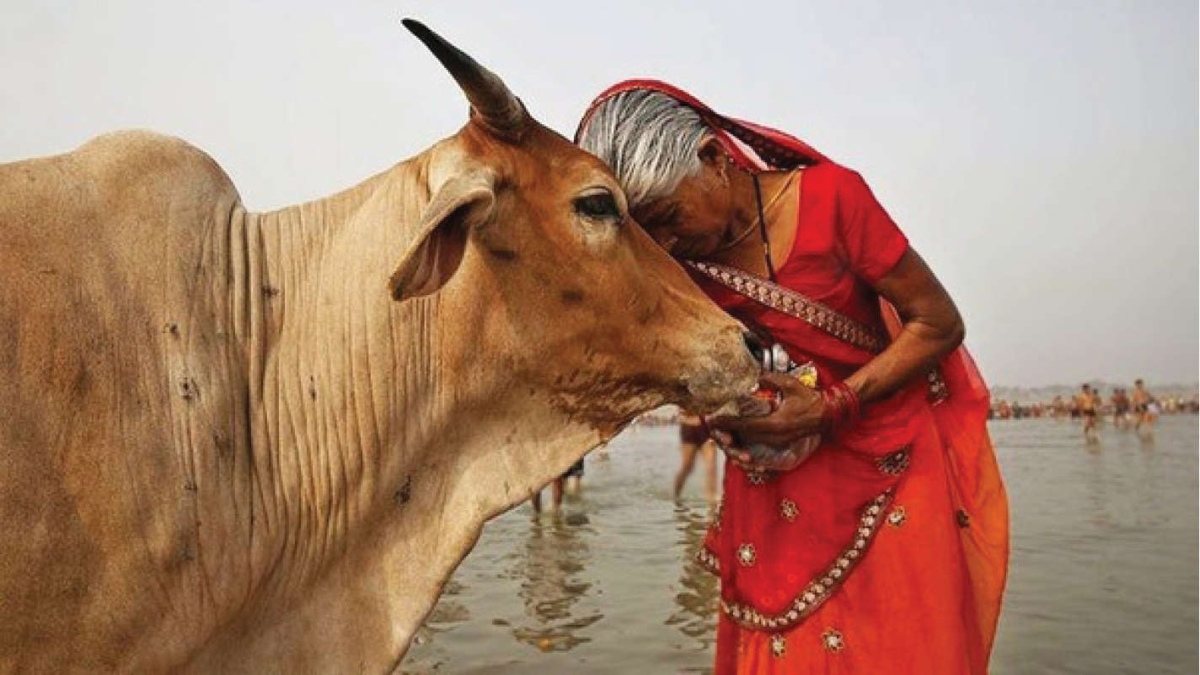


Man comes to earth, embodies a body and the formlessness incarnates the form. Together, the seed of a body and an incarnation takes the form, but the formless always remains formless, as distinct and away from the body. Man can revisit his womb by going deep into meditation trying to remember his past. If one does that, one day, one reaches the memory of his womb as one also reaches the memories of past births.
It is the most intriguing question: if the body that we have discovered is in the process of evolution, how does soul, the formlessness, come in? Are we primitive? Or are we here just by accident? Or are we the result of our desires that don’t let us leave our soul?
Knowers of the truth say that man’s body comes from the monkey as it looks so. But when yogis in India had gone back to their lives, they found themselves born as a cow after a few births. Certainly, man’s soul comes from the cow.
In India, we have great regard for the cow. We call her ‘mother’. Cows for Hindus are a manifestation of God for various reasons.
A beautiful story in the history of Hindus comes from when the churning of the ocean was done. In fact, the irascible sage Durvasas’s ire made the race of gods permanently impaired of their vigour, energy and power and become mortals. Durvasa felt outraged at Indra’s demeanour and cursed all the gods that they would lose their power. To get their power back, the gods had to drink from the sea of milk that would secure them immortality. When the ambrosial ocean was churned, it threw up fourteen jewels, chaturdasaratnam, among them. One of the jewels was Surabhi, also known as Kamadhenu, which grants every wish and was taken by the seven rishis who form a constellation.
This is the first mention of the cow in Hindu scriptures. Hindus believe that Kamadhenu is the cow and her DNA runs in all cows.
In the Rig Veda, there is another beautiful story about the legendary dog Sarama who rescues Indra’s cows and is regarded as the ‘divine bitch’. Narrators of the story describe that a demon tribe called the Panis stole Indra’s herd of cows and hid it on the other side of the great river Rasa. The seven priests of heaven known as the Angirases (Saptrishis) needed the milk of the cows for food and realized that they were missing. A great search was afoot. Finally, Sarama was tasked to go in search of the cows, but on the condition that, henceforth, Sarama too shall be given the purer and tastier milk of Indra’s cows. Sarama followed the path of the Panis, crossed the river and asked the demon tribe to give the cows back. The Panis bribed Sarama with milk. Sarama was desperate for food and drink and drank the milk. When she was full of energy, she rushed back to Indra after crossing the mighty river and guided the army to the Panis and the cows were led back and Sarama was rewarded with milk.
There is another beautiful story from the Chandogya Upanishad. Uddalak was a great rishi. He sent his son, Shvetketu, to get educated by the master at the gurukul. Shvetketu spent many years there and returned at 24. Uddalak saw that Shvetketu had returned with a great degree of knowledge and thought himself to be a great scholar. He saw that Shvetketu had forgotten basic humility and started to think that his father knew nothing. Uddalak confronted his son and asked him, “Have you learnt everything that is to be learnt?” Shvetketu said, “Whatever my guru knew, I know now. You can test me on it.” To this, Uddalak said, “In our kul (clan), we are real Brahmins. We are not Brahmin just because we recite scriptures.” Uddalak then sent him back to the guru and asked him to go learn by learning everything which is to be learnt. Shvetketu went back to the guru. The guru gave to Shvetketu a herd of one hundred cows and asked him to go to the jungle and return only when the cows have become one thousand in number.
Shvetketu went to the jungle and started taking care of the cows. Years passed by. The cows bore calves and the calves became cows. Many more years passed. Shvetketu forgot to count them. He became just like the cows. He would help them graze, take care of them and look into their eyes. Many years passed, and the herd grew to one thousand cows. But Shvetketu had forgotten that he had to return them. So, the cows spoke to Shvetketu and told him, “We are one thousand now. Let’s go back.”
Shvetketu returned to his guru. The other disciples counted the cows. They told the guru that there were exactly one thousand cows. The guru said, “No, they are one thousand and one. Shvetketu has also become one of the cows.” When Shvetketu returned home, his father saw him come. He touched the feet of his father as tears rolled down his father’s face and he hugged him. This time, his father did not have to say anything because Shvetketu had learnt everything there was to be learnt.
Cows can give one a glimpse of Him. If you look into their eyes, they will make you look back into yourself and realise who is the one looking at those eyes. That is the time when you return home. By constantly being with cows, one can become absolutely empty.
The author is a spiritual coach and an independent advisor on policy, governance and leadership. He can be contacted at arunavlokitta@gmail.com.